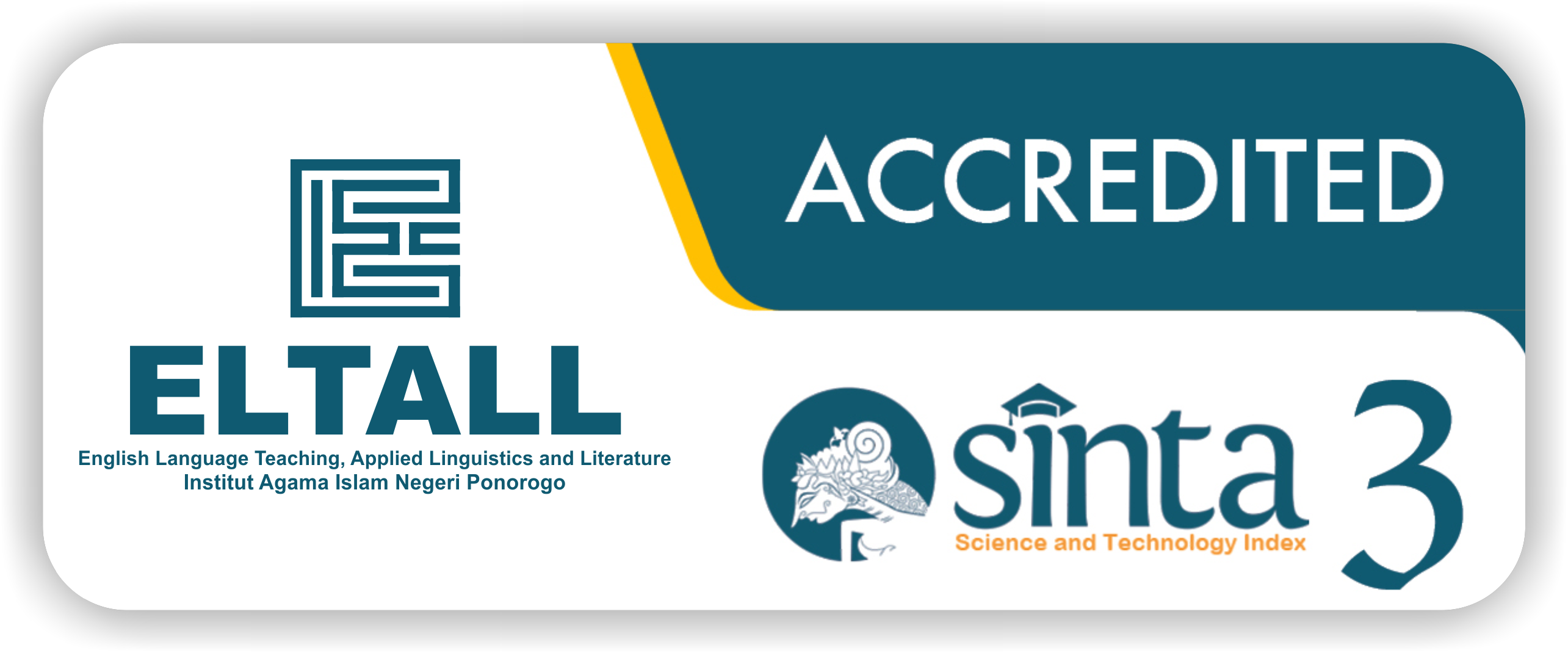High School EFL Teachers’ Continuous Professional Development: Target Needs, Reflection and Challenges
DOI:
https://doi.org/10.21154/eltall.v4i01.4941Keywords:
EFL Teachers, Continuous Professional Development, Target Needs, Reflection, ChallengesAbstract
This research investigated the high school EFL teachers’ continuous professional development target needs, reflection and challenges. Further, the target needs of the EFL teachers were analyzed by adapting Hutchinson and Waters’ model (1987). The data were collected using a test, questionnaire (consisted of five parts), and interview; these were administered to 20 high school EFL teachers. A test was administered to identify EFL teachers' present situation and difficulties, and questionnaire parts 1, 2 and 4 dealt with the EFL teachers' difficulties, needs and purposes in the program. Moreover, these were used to identify EFL teachers’ target needs centered on their lacks, necessities, and wants to function in the target situation effectively. Parts 3 and 5 concerned high school EFL teachers' reflection and challenges in the professional development program they are involved in.
Additionally, interviews were conducted with the high school EFL teachers to gather data to examine in-depth results of the target needs, reflections and challenges. The results suggested that the high school EFL teachers have different views of their lacks, wants and necessities. The findings also demonstrated that the high school EFL teachers reflected that the current professional development program practicing in their school was never conducted to help EFL teachers develop their profession. Finally, the result revealed that high school EFL teachers face various challenges in the current program they are taking. Therefore, the professional development should be revised according to EFL teachers’ target needs, reflections and challenges.References
Abrar kedir & Hailu Gutema (2022). Primary School EFL Teachers’ Continuous Professional Development Needs. Communication and Linguistics Studies. Vol. 8, No. 1, 2022, pp. 1-15. DOI: 10.11648/j.cls.20220801.11
Bailey, K., Curtis, A. &Nunan, D. (2001). Pursuing professional development: the self as source. Boston, MA: Heinle&Heinle.
Belilew M. & Hailemariam M. (2017). An Insight into Professional Development Obstacles Facing Ethiopian Primary School EFL Teachers. International Journal of Foreign Language Teaching & Research. Volume 5, Issue 17, spring.
Berwick, R. (1989). Needs assessment in language programming: From theory to practice. In R.K. Johnson (ed.), The second language curriculum (pp. 48”“62). Cambridge: CambridgeUniversity Press.
Birhanu S. (2014). EFL Teachers’ Self-Initiated Professional Development: Perceptions and Practices. Educational Research and Reviews. Vol. 9(21), pp. 1109-1114, 10 November, 2014. DOI: 10.5897/ERR2014.1898
Brindley, G. (1989). The Role of Needs Analysis in Adult ESL Program Design. In R. Johnson(Ed.). The Second Language Curriculum. Cambridge: Cambridge University Press.
Day, C. (1999). Developing teachers: The challenges of lifelong learning. London: Falmer Press.
Dornyei, Z. (2003). Questionnaires in second language research: Construction, administration, and processing. London: Lawrence Erlbaum Associates, Publishers.
Dudley Evans, T., & St. John, M. (1998). Developments in ESP: A multi-disciplinary approach. Cambridge: Cambridge University Press.
Fullan, M., & Hargreaves, A. (2002). Teacher development and educational change. New York: Routledge.
Getachew W., Eba M. & Zeleke T. (2019). Primary school EFL teachers’ professional development needs in Benishangul Gumuz Regional State. International Journal of Management, Technology and Engineering. Volume IX, Issue II, FEBRUARY/2019, ISSN NO : 2249-7455 Page No: 1029
Hargreaves, A., and Fullan, M. G. (Eds.). (1992). Understanding teacher development. New York: Teachers College Press, Columbia University.
Hutchinson, T. & Waters, A. (1987). English for specific purposes. Cambridge: Cambridge University Press
Hutchinson, T., Waters, A. (1987). English for specific purposes. Cambridge: Cambridge University Press, pp. 53”“56.
Koc, S. (1992). University, Ankara, Turkey. . Teachers on-line: An alternative model for in-service teacher training in ELT, ELT and Teacher Training in the 1990s. Tradition and Innovation, 1, 47 ”“ 53
Lee, H. (2005). Developing a professional development program model based on teachers' needs. Professional Educator, 27(1-2), 39-49.
West, R. (1997). Needs analysis: State of the art. In R. Howard and G. Brown (Eds.), Teacher education for languages for specific purposes (pp. 68-97). London: Multilingual Matters.
Widodo, H. P. (2018). Needs Assessment in Professional Development (PD). The TESOL Encyclopedia of English Language Teaching, First Edition. Edited by John I. Liontas (Project Editor: Margo DelliCarpini). © 2018 John Wiley & Sons, Inc. Published 2018 by John Wiley & Sons, Inc. DOI: 10.1002/9781118784235.eelt0887









